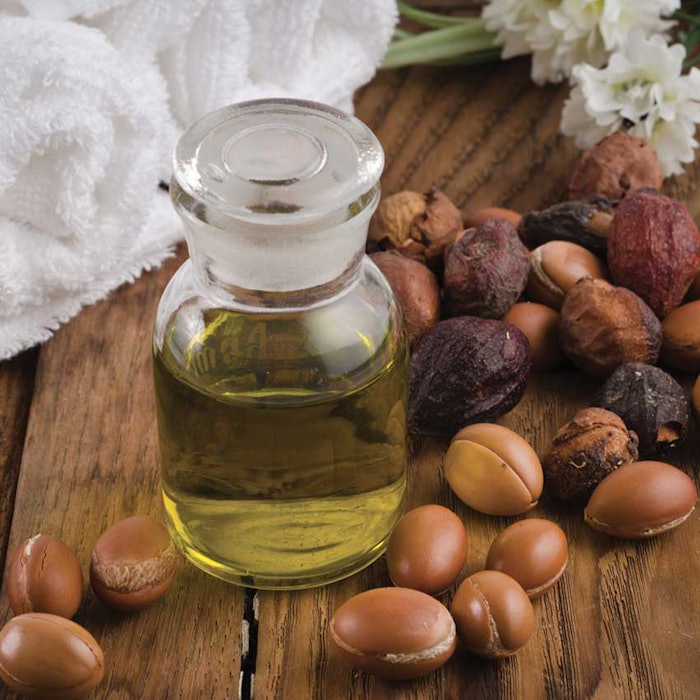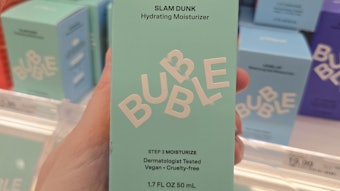
*Reproduced with permission from Skin Inc.
Plant oils have risen in the skin care ranks, not only as ingredients in treatment products, but as their own product category for massage or skin treatments. These oils can provide tremendous benefits for the right skin type, some of which are described here.
Oil Composition and Skin Barrier
As one might expect, there is significant variability in plant oil compositions, and some oils can cause problems for impaired skin barriers. Plant oils consist of triglycerides and small amounts of free fatty acids, which are known to disrupt skin barrier function. For example, oleic acid, an unsaturated fatty acid and a transdermal penetration enhancer, can disturb epidermal barrier function in children with eczema. Eczema is a chronic skin condition characterized by defects in the skin barrier function and the impaired ability of skin to hold water, which causes dryness. Such a detriment from this ingredient could be extended to all skin types with weak barrier functioning, in those who are genetically predisposed or those afflicted by external stressors.
Oleic and palmitoleic acids, present in plant oils such as olive and grape seed, have been shown to induce epidermal hyperplasia, clinically manifesting as scaly skin and abnormal follicular keratinization, which is implicated in acne.1
In the lab, molecular interactions have been shown between oleic acid and model stratum corneum lipids consisting of ceramide, cholesterol and palmitic acid. Lower concentrations of oleic acid preferentially mix with and disrupt the order of the ceramide-enriched domains. This is followed by perturbation of the palmitic acid-enriched domains. At higher levels of oleic acid, a disruption in skin lipid domain separation is observed.2
Oleic acid increases water loss and substance penetration 24 hr after a single application in a dose-dependent manner, as shown clinical research by Johnson & Johnson. Oleic acid can permeate deep into the skin, reaching the dermal/epidermal junction.
The affinity between plant oil components and skin lipids determines the extent of their penetration and clinically measurable effects on skin barrier function.3 However, following is a brief review of several plant oils and some of their reported effects in skin.
Hydration: Seabuckthorn
The effectiveness of any plant oil depends on its composition, the skin type on which it is used, the targeted tissue and finally, the concentration. Thus, despite the presence of palmitoleic acid in seabuckthorn extract, this oil has been shown to have a positive effect on skin conditions in healthy Asian men. When applied as an emulsion over 84 days, seabuckthorn extract (5%) improved skin hydration and skin barrier function.4
Anti-aging: Camellia
Camellia japonica oil has been reported to have anti-wrinkle potential inducing type I pro-collagen synthesis and inhibiting the activity of matrix metalloproteinase in cell culture. Camellia oil also was shown to improve skin barrier function in Asian skin.5
Barrier Strength: Argan
A recent review deemed plant oils containing supplements as beneficial to the skin barrier.6 Daily consumption plus topical application of argan oil was tested in the challenged skin of postmenopausal women in Morocco. After a 60-day period, oral consumption and topical application of argan oil led to an improvement in skin barrier function and increased hydration.7
Skin Softness: Coconut and Mineral Oils
The benefits of topical virgin coconut were shown in Asian children having mild to moderate eczema. Clinical improvements in skin condition, TEWL and hydration were observed; notably superior to that of mineral oil.8
Data also supports the use of mineral oil to improve skin softness and barrier function. Compared with other vegetable oils, mineral oil was most favorable; its physical effects on the skin translated into biological effects simply through its mechanism of hydrating and occluding the stratum corneum, from which many benefits are derived.9
Developing Skin: Exercise Caution
It is important to note mainstream academic research from the UK has shown that topical oils on immature baby skin may contribute to the development of childhood atopic eczema.
Full-term newborn babies were randomly assigned to receive applications of olive oil, sunflower oil or no oil twice daily for four weeks, stratified by family history of atopic eczema. Babies treated with oils had significantly improved hydration but significantly less improvement in lipid lamellae structure. Therefore, until further research is conducted, caution should be exercised when recommending oils for neonatal skin.10
In relation, in Germany, the effect of sunflower seed oil on skin barrier development in premature infants was related to a delay in skin barrier maturation.11
Acne Treatment-induced Dryness: Evening Primrose
In acne, abnormal keratinization of the follicles is one of the first steps in comedone formation, which suggests an impaired skin barrier.12 Teenage boys, with or without acne afflictions, were monitored over the course of one year, month by month. Their sebum production in terms of skin oiliness was found to be lowest in the winter and highest in the autumn. However, skin barrier disruption was high across all seasons. Evidence for seasonality, with lower lipid production and reduced barrier function during the winter, thus calls for a considerate approach when using plant oils topically in skin prone to acne.13
Plant oils can, however, help the dryness caused by acne treatments. Dermatologists have observed adverse effects from the oral acne drug isotretinoin, including both inflammation and dryness of the upper lip skin. Evening primrose oil has therefore been suggested to benefit acne patients based on its ability to improve skin hydration and barrier function in healthy skin and eczema.
In a study of Asian volunteers having moderate acne, all were treated with isotretinoin and some received oral capsules of evening primrose oil for eight weeks in addition to topical evening primrose oil treatments. Barrier function of the lip was disrupted during isotretinoin treatment but oral oil application diminished this dryness. As the drug reduced acne lesions in both groups, the addition of oral evening primrose oil improved the skin of acneic patients.14
Follow the Research
Advances in research regarding the effects, both good and bad, of plant oils in different skin types are ongoing. This emphasizes the need to follow new research, in order to understand the day-to-day as well as seasonal implications for consumers.
References
- CosmeticsandToiletries.com/research/biology/199897981.html (Accessed Jan 19, 2017)
- GL Mao et al, Oleic acid disorders stratum corneum lipids in Langmuir monolayers, Langmuir 29(15) 4857-65 (Apr 16, 2013)
- M Correa et al, Molecular interactions of plant oil components with stratum corneum lipids correlate with clinical measures of skin barrier function, Exp Dermatol (1) 39-44 (Jan 23, 2014)
- BA Khan and N Akhtar, Hippophae rhamnoides oil-in-water (O/W) emulsion improves barrier function in healthy human subjects, Pak J Pharm Sci (6)1919-22 (Nov 27, 2014)
- E Jung et al, Effect of Camellia japonica oil on human type I procollagen production and skin barrier function, J Ethnopharmacol 112(1) 127-31 (May 30, 2007)
- CosmeticsandToiletries.com/formulating/category/nutricosmetics/A-Great-Barrier-Enhanced-A-Review-of-Oral-PUFA-Supplements-for-Skin-390751311.html (Accessed Jan 19, 2017)
- researchgate.net/publication/270675314_Skin_hydration_in_postmenopausal_women_Argan_oil_benefit_with_oral_andor_topical_use (Accessed Jan 19, 2017)
- MT Evangelista, F Abad-Casintahan and L Lopez-Villafuerte, The effect of topical virgin coconut oil on SCORAD index, transepidermal water loss, and skin capacitance in mild to moderate pediatric atopic dermatitis: a randomized, double-blind, clinical trial, Int J Dermatol 53(1) 100-8 (Jan 2014)
- AV Rawlings and KJ Lombard, A review on the extensive skin benefits of mineral oil, Int J Cosmet Sci (6)511-8 (Dec 2012)
- AL Cooke, Olive oil, sunflower oil or no oil for baby dry skin or massage: A pilot, assessor-blinded, randomized controlled trial (the Oil in Baby SkincaRE [OBSeRvE] Study), Acta Derm Venereol 96(3) 323-30 (Mar 2016)
- V Kanti et al, Influence of sunflower seed oil on the skin barrier function of preterm infants: A randomized controlled trial, Dermatology 229(3) 230-9 (2014)
- A Yamamoto, K Takenouchi and M Ito, Impaired water barrier function in Acne vulgaris, Arch Dermatol Res 287(2) 214-8 (1995)
- K Meyer et al, Evaluation of seasonal changes in facial skin with and without acne, J Drugs Dermatol (6) 593-601 (Jun 2015)
- KY Park et al, The effect of evening primrose oil for the prevention of xerotic cheilitis in acne patients being treated with isotretinoin: A pilot study, Ann Dermatol 26(6) 706-12 (Dec 2014)










